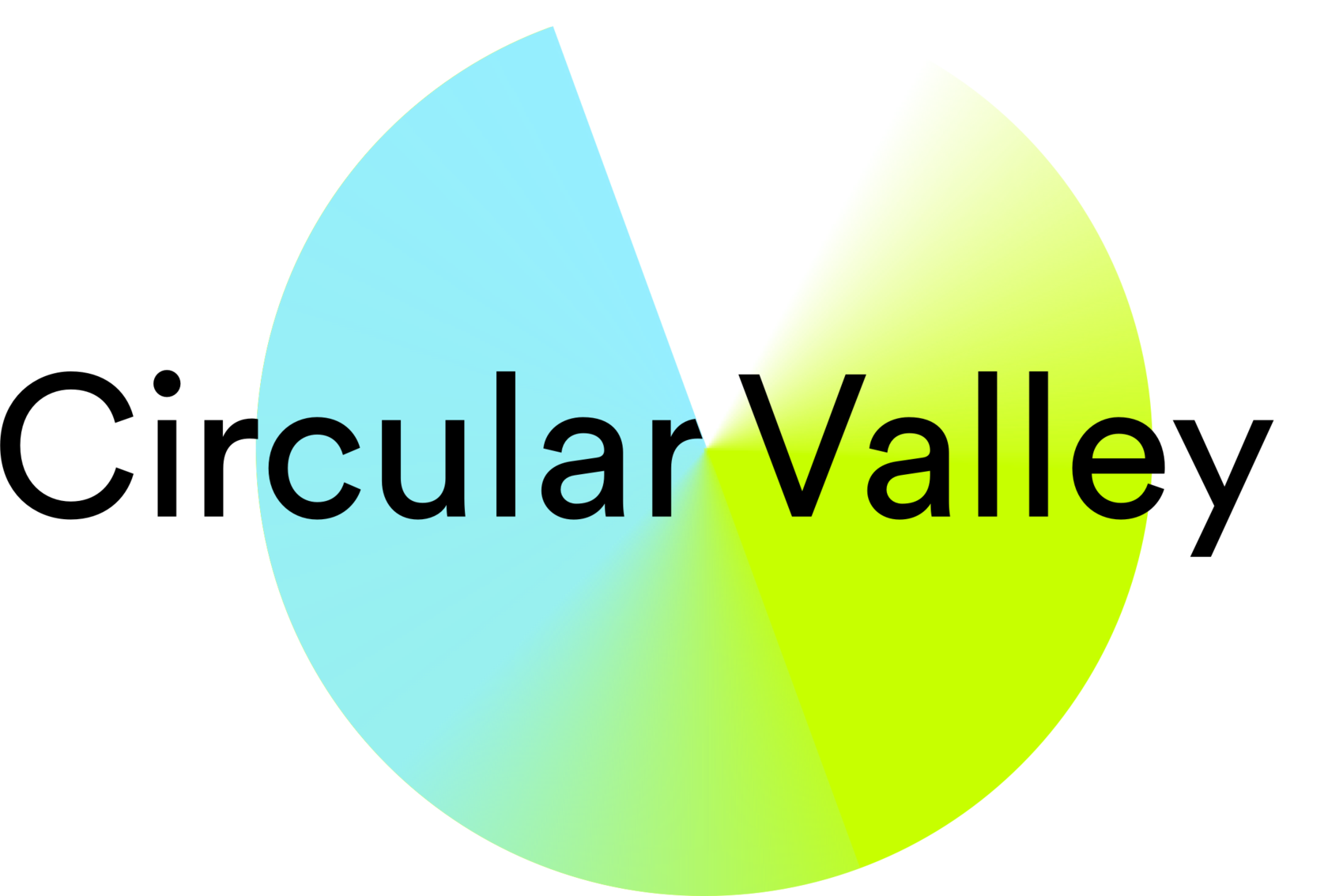2023-04-05
Circular Valley
Newsletter 1/2023
Newsletter 1/2023
DemoDay Batch#4
Circular Valley awakens "the sleeping giant"
Grand finale for the current batch of the Circular Economy initiative: 14 startups presented their ideas to prevent billions of tons of emissions. Support came from both industry and politics.
There's one emission that even Circular Valley®, the circular economy initiative, appreciates. It is the noise level after the pitches of the international startups at the DemoDay. This applause was particularly loud at the grand finale of the current accelerator round, where young companies from around the world presented their ideas to avoid billions of tons of waste, CO2 and water pollution. The interest from the established industry, politics and science was high. The decision-makers held intensive discussions with the startups, which, among other things, presented water desalination facilities using solar energy, a platform for trading industrial waste and reusable boxes for e-commerce.
Mona Neubaur, Deputy Prime Minister of the State of North Rhine-Westphalia and patron of Circular Valley®, emphasized at the DemoDay what the startups achieve:
Mona Neubaur, Deputy Prime Minister of the State of North Rhine-Westphalia and patron of Circular Valley®, emphasized at the DemoDay what the startups achieve:
Turning our economic life upside down, moving from the line to the circle - this is the task Circular Valley® is taking on.
Mona Neubaur,
stellvertretende Ministerpräsidentin des Landes NRW und Schirmfrau des Circular Valley®
Mona Neubaur,
stellvertretende Ministerpräsidentin des Landes NRW und Schirmfrau des Circular Valley®
"The potential that is coming together here is something we see in many impressive examples today." Neubaur explained the path to climate neutrality, raw material lightness and sustainability. "We need functioning business models that make recycling possible: Using instead of owning, intelligent matching platforms on which products lead a second, third or fourth life, and many more," the State Minister of Economics added.
Matching is one of the central goals of Circular Valley®. The initiative aims to transform Germany's wider Rhine-Ruhr region into a global hotspot for the circular economy: a Silicon Valley for the circular economy. The initiative brings startups from all over the world to North Rhine-Westphalia and supports them in further developing their business model - with top-class coaches and mentors and by connecting them with potential partners from business and research institutions. The 14 startups that were in Circular Valley® over the past months, brought ideas for green building, renewable energy, industrial waste platforms, water treatment and waste management for the potential matches.
Viktor Haase, State Secretary at the North Rhine-Westphalia Ministry of the Environment, placed Circular Valley®'s efforts into a political context at the DemoDay. According to him, the circular economy is a "sleeping giant" in North Rhine-Westphalia that is now being awakened. The state government will present a strategy for the circular economy in the coming months, as will the federal government.
Matching is one of the central goals of Circular Valley®. The initiative aims to transform Germany's wider Rhine-Ruhr region into a global hotspot for the circular economy: a Silicon Valley for the circular economy. The initiative brings startups from all over the world to North Rhine-Westphalia and supports them in further developing their business model - with top-class coaches and mentors and by connecting them with potential partners from business and research institutions. The 14 startups that were in Circular Valley® over the past months, brought ideas for green building, renewable energy, industrial waste platforms, water treatment and waste management for the potential matches.
Viktor Haase, State Secretary at the North Rhine-Westphalia Ministry of the Environment, placed Circular Valley®'s efforts into a political context at the DemoDay. According to him, the circular economy is a "sleeping giant" in North Rhine-Westphalia that is now being awakened. The state government will present a strategy for the circular economy in the coming months, as will the federal government.
If we have to import raw materials, then we should only do this once and run them in circles from then on.
Viktor Haase,
State Secretary at the North Rhine-Westphalia Ministry of the Environment
Viktor Haase,
State Secretary at the North Rhine-Westphalia Ministry of the Environment
Addressing the Circular Valley® startups he added, "Your economic success is securing our future foundations.""
Which players can help awaken this sleeping giant, was explained by Dr. Andreas Eurich, CEO of the Barmenia Insurance Group. The Barmenia insurance group has been a part of the Circular Valley® initiative from the very beginning. According to Eurich, the state alone can not raise the funds needed for climate protection; the private sector is also needed. Insurance companies are reliable providers of capital in this context. Globally, insurance companies manage a total of around 1.8 trillion euros and will increasingly invest these in sustainable projects. To this end, Barmenia has even founded a company for innovative business models: BNS, short for Barmenia next strategies.
Towards the end of the event, Circular Valley® initiator Dr. Carsten Gerhardt discussed with Dr. Johannes Velling how startups and established businesses can grow together more closely. Dr. Velling has supported around 5000 young companies in various federal and state projects (including "Exist" and through HighTech-Gründerfonds). His advice: Rattle off more to sell yourideas even better. Think bigger, i.e., beyond one's own region. And find a common culture with the big companies.
Following the DemoDay, the work for the circular economy in Circular Valley® continues with full momentum. The initiative has a new partner by its side, with whom it has now signed a cooperation agreement: the Global Entrepreneurship Centre (GEC). The company helps startups to scale their business model and to make it fit for the next rounds of investors. Among the startups that presented their ideas at DemoDay, several are now being supported by the GEC. The signing of this cooperation also made for a loud round of applause at the Circular Valley® DemoDay.
Towards the end of the event, Circular Valley® initiator Dr. Carsten Gerhardt discussed with Dr. Johannes Velling how startups and established businesses can grow together more closely. Dr. Velling has supported around 5000 young companies in various federal and state projects (including "Exist" and through HighTech-Gründerfonds). His advice: Rattle off more to sell yourideas even better. Think bigger, i.e., beyond one's own region. And find a common culture with the big companies.
Following the DemoDay, the work for the circular economy in Circular Valley® continues with full momentum. The initiative has a new partner by its side, with whom it has now signed a cooperation agreement: the Global Entrepreneurship Centre (GEC). The company helps startups to scale their business model and to make it fit for the next rounds of investors. Among the startups that presented their ideas at DemoDay, several are now being supported by the GEC. The signing of this cooperation also made for a loud round of applause at the Circular Valley® DemoDay.
The recording of the DemoDay can be found here.
DemoDay Batch#4 - Aftermovie
2023.03.23 I Historische Stadthalle Wuppertal
Giga-Impact
Circular Valley startups have ideas that avoid billions of tons of emissions
Fourteen young companies from around the world have advanced their business models in the extended Rhine-Ruhr region in recent months. They have different focuses, but one important thing in common: a "giga-impact."
Many of the fourteen startups that participated in the fourth batch of the Circular Economy Accelerator program, traveled to Germany from all over the world, including from Palestine, Singapore, the US and Kenya. The fourteen companies are engaged in water treatment, waste management, platform solutions, green building, or renewable energies. As the following overview shows, their ideas have the potential to avoid CO2 or waste in the order of billions of tons:
Water treatment and desalination
- ColeaPalestineThe Palestinian startup helps olive farms and mills worldwide. Globally, this agricultural sector produces around 30 million cubic meters of wastewater annually. Colea AgriTech has developed a technology to treat this water so that it can be reused. Employing this technology allows olive producers operate more circularly and profitably.
Photo: Thaer Thafesh - CyFractGermanyThe founders from Munich, Germany, have enabled a major step forward for capturing very small particles. Until now, removing microparticles from water has not only required a great amount of energy, but many filter systems also have weaknesses. CyFract sets water in rotation, thereby separating the tiny particles and requiring a lot less energy.
Photo: Tayyar Bayrakci - DesolenatorNetherlandsThe Dutch startup uses nature to produce drinking water from the sea. The founders have developed the world's first solar thermal solution for desalination. The power of the sun ensures that fresh water is available on a large scale - and that it is also produced sustainably.
Photo: Marc Alexander Schwarze and Nick Heinemann - Bio-RecyclerKeniaBio-Recycler's The idea that the Kenyan startup is pursuing, is not only a great opportunity for its home country, but also beyond. Due to massive environmental and water pollution in Kenya, clean drinking water is rare. To this end, Bio-Recycler recycles and treats wastewater - currently at already 13,200 liters per day.
Photo: Calvince Okello - HydroleapSingaporeThe focus of the startup from Singapore is the treatment of industrial wastewater. Thanks to its technology, only a fraction of the current amount of chemicals used is required, reducing their demand by 80 percent. At the same time, 40 percent more water has been saved. A nice side effect for the companies is that wastewater treatment costs fall by around 30 percent. Hydroleap has already attracted a lot of attention in Asia, and now the technology is coming to Europe - with the help of Circular Valley®.
Photo: Lakshmi Jothinathan, Preneshan Reddy
Waste treatment and packaging
- LixoFranceThe French startup uses artificial intelligence to enable a true circular economy. The technology analyzes waste in real time as it moves down the assembly line, giving an accurate overview of what recyclables it contains. This makes waste management more transparent, efficient and traceable. Lixo's solution is therefore of interest to many players along the recyclables value chain, such as disposal companies, sorters and recyclers. While the young company has already won major partners such as Suez and Veolia, it now wants to grow internationally in the next step.
Photo: Marjorie Darcet - RhinopaqGermanyFor the founders from Essen, Germany, a bitter figure and the image of shipping containers formed the beginning of their idea. The bitter figure: every fourth tree is felled for packaging. This wouldn't have to be the case if packaging from online retail were stored in containers that could be reused over and over. And this is exactly what Rhinopaq's boxes and envelopes made of recycled polypropylene do: They replace disposable packaging when shipping tools, personal care products, cleaning products, coffee, toys and pet food, for example.
Photo: Matthias Thesing (left) und Marc Diefenbach - Circular Valley DeliveryGermanyThis project will be introduced in a separate article in this newsletter.
You can find i5 here.
Photo: Dr. Carsten Gerhardt
Green building
- RecycleXIndiaThe Indian startup uses industrial waste and disposed plastic to make its products. For instance, industrial slag, fly ash and metal waste are used to create new bricks, cobblestones, tiles, planters, benches, and curbstones. A RecycleX "Fly Ash Brick" contains no natural resources and avoids one kilogram of CO2. The founders' solution is therefore twofold: no waste is produced because materials remain in the cycle. At the same time, the need for cement is significantly reduced, and with it the impact on the climate. RecycleX is relevant to a wide range of potential partners, ranging from waste collectors, industry to the construction sector. RecycleX's solution is particularly interesting for booming regions, whose population and thereby built environment is expected to grow significantly.
Photo: Abhishek Chhazed
Platforms
- CyrklCzech RepublicThe Austrian and Czech founders have launched Europe's largest online waste platform – with more than 18.000 registered companies in 11 countries. Cyrkl offers three services: a free-of-charge marketplace that customers can use independently. For more complex cases, the startup offers its customers a fee-based consulting, to support them throughout the process. Cyrkl's consulting activities are even more intensive in the third field of activity, which deals with strategic and structural solutions. Here, waste is analyzed and suggestions are made for the most suitable ways of dealing with it.
Photo: David Mattersdorfer (left) und Cyril Klepek - MikaCycleFranceThe French startup is an expert in plastic recycling. The startup began by researching the pain points and weaknesses in the procurement process and then developed their global marketplace for high-quality recycled plastic. Trading on its marketplace should be as easy as possible for both sides. Quality and trust are paramount for Mika Cycle to enable the progress they hope to make. Transparent supply chains are an important building block in this. The goal: Where plastic cannot be avoided, as much of it as possible should remain in the cycle. To this end, the company wants to standardize recycling processes and make them more productive.
Photo: Scott Brooks - ClickwasteGermanyThe German startup from Heidelberg uses its slogan to explain what change is associated with the platform: "Turning waste to value". In other words, the waste materials that companies previously had to pay for to dispose of, suddenly become a new revenue stream. Clickwaste offers its services for a wide range of materials – in the same way that individual consumers are familiar with from online marketplaces.
Photo: Dr. Daniel Vuynovich
Renewable energy from a circularity perspective
- 1s1-EnergyUSAThe US startup develops water electrolysis systems for hydrogen production with renewable energy. While hydrogen is currently mainly produced using methane and coal, 1s1 Energy is working on truly green hydrogen. This plays a key role in decarbonization efforts, especially in the industrial, chemical and long-distance transportation sector. The 1s1 systems are said to be about 30 percent cheaper than comparable water electrolysis systems on the market.
Photo: Daniel Sobek - CO2NVERTItalyThe Italian founders have developed a method to replace current ethanol production methods. 95 percent of the world's ethanol originates from agriculture. The consequences: high emissions, soil erosion, loss of biodiversity and enormous water consumption. The solution: CO2NVERT takes CO2 that would otherwise be released into the atmosphere and combines it with green hydrogen to create sustainable ethanol. This is the first of a whole series of chemical products that the Italians want to produce green.
Photo: Paolo Licata (right)
Waste treatment and packaging
Circular Valley Delivery: The delivery service that also takes you home
Our cities are characterized by transport journeys: numerous providers deliver parcels, groceries and other products to the home. On the reverse, these deliveries lead to many empty trips - and thus a lot of potential. This has led to a new push in Circular Valley®.
"When you work with so many startups and partners, your own ideas will begin to emerge sooner or later," said Dr. Carsten Gerhardt, initiator of Circular Valley®, at the DemoDay. At the end of the event, Gerhardt was not on stage to introduce another young founder, but to present one of the initiative's own business ideas. The idea he presented is called Circular Valley® Delivery and is intended to bring about an important upheaval in the last mile delivery system.
Currently, the transportation that characterizes cities faces two problems: First, the last mile is deregulated, meaning all providers deliver directly to the customer. Second, most of these providers exclusively bring things, but take nothing back with them. This creates waste, a lot of which ends up being incinerated. If consumers want to dispose of the packaging properly, they have to drive to various different containers and collection points. This is anything but efficient.
That's why Circular Valley® Delivery aims to be a last-mile delivery service for everyone that also takes back material to prepare it for recycling as cleanly as possible. In addition, the employees could provide additional services, for instance, transporting people. In short, this delivery service can do more, while having much fewer empty runs.
Gerhardt explained to the DemoDay audience these five prerequisites:
Currently, the transportation that characterizes cities faces two problems: First, the last mile is deregulated, meaning all providers deliver directly to the customer. Second, most of these providers exclusively bring things, but take nothing back with them. This creates waste, a lot of which ends up being incinerated. If consumers want to dispose of the packaging properly, they have to drive to various different containers and collection points. This is anything but efficient.
That's why Circular Valley® Delivery aims to be a last-mile delivery service for everyone that also takes back material to prepare it for recycling as cleanly as possible. In addition, the employees could provide additional services, for instance, transporting people. In short, this delivery service can do more, while having much fewer empty runs.
Gerhardt explained to the DemoDay audience these five prerequisites:
Five prerequisites:
- Circular Valley® Delivery must have attractive vehicles. On the one hand, this means smartly designed space to enable drop-off and pick-up of products and materials. On the other hand, the vehicle must be so appealing that people are happy to use it for being transported for their destination.
- The new service must be combined with practical transport boxes to avoid waste and to transport everything safely on the way there and back.
- The delivery service needs reliable staff. They need to be very safe drivers who radiate confidence so that customers are willing to let them into their homes for any additional services.
- Circular Valley® Delivery needs many vehicles to serve the market well.
- And it needs to offer other services, through which additional target groups can be reached who take advantage of the basic services.
"These are the ideas we now want to discuss," said Carsten Gerhardt - a topic that will certainly be discussed further at the next DemoDay.
Visits to companies
Companies from North Rhine-Westphalia provide Circular Valley startups glimpses into their cycle
Founders from all over the world have taken part in the current batch of the Circular Economy Accelerator program. An important element on the itinerary during the program: Visits to companies that operate at different points along different stages of the cycle: from mining raw materials to recovering recyclables.
Startups that Circular Valley® invites to its accelerator use their time in Germany's extended Rhine-Ruhr region for two things primarily: they advance their business models further with top-class mentors and coaches and through exchanges and discussions among themselves. The second core focus during their time in Germany is that they meet partners from the large Circular Valley® network - in personal conversations, plenary discussion formats and on-site at the companies.
These on-site visits are highlights for both sides. The startups get to see real-world practice on a large scale and get a chance to understand where their ideas could best fit in and support established companies. The established companies, in turn, obtain fresh ideas and an unbiased perspective on their day-to-day operation.
The 14 startups from the current accelerator program visited the following destinations:
The Lhoist Group is a global leader in the production of limestone and other minerals. The company's headquarters are in Belgium and its German headquarters are in Wülfrath. At the nearby site in Wuppertal-Dornap, the Circular-Valley® startups were able to watch the mining of limestone and trace the following production steps. The preparation of the stone consists of pre- and post-shredding. Sieving is then used to separate the stone into the appropriate grain sizes. During their visit, the startups also discovered an impressive board, on which Lhoist displays the numerous applications of limestone. The board consisted of 16 pictures on the board, each representative of an industrial sector, ranging from metal production over rail transport to e-mobility.
For the experts visiting from all around the world, the visit to Lhoist was associated with another important insight, related to renaturation. Where Lhoist no longer mines, the area is returned to nature. Through the renaturation process, biodiversity in these areas is typically higher than before the mining began.
The Bergkamen Supply Center is Bayer AG's largest site for the production of active pharmaceutical ingredients. At this site, more than 1,600 employees produce steroid hormones, contrast media and intermediates of highest purity. The focus of the excursion of the circular startups was the company's strategy for sustainability and the Circular Economy - in intensive discussions and in a very practical way: Stations on the site included the company's own power plant and water treatment facility. Bayer purifies the wastewater, filters out most of the chemicals and reuses substantial quantities of it.
Just as the startups asked numerous questions, Bayer representatives also wanted to know a lot from their guests: How can startups be supported most suitably? What needs do they have? What points of contact do they need? - these were some of the topics discussed during the visit. A nice discovery on the side: On the Bayer premises, a container of the Circular Valley® startup Circularity collects work clothes in order to recycle the textiles.
These on-site visits are highlights for both sides. The startups get to see real-world practice on a large scale and get a chance to understand where their ideas could best fit in and support established companies. The established companies, in turn, obtain fresh ideas and an unbiased perspective on their day-to-day operation.
The 14 startups from the current accelerator program visited the following destinations:
The Lhoist Group is a global leader in the production of limestone and other minerals. The company's headquarters are in Belgium and its German headquarters are in Wülfrath. At the nearby site in Wuppertal-Dornap, the Circular-Valley® startups were able to watch the mining of limestone and trace the following production steps. The preparation of the stone consists of pre- and post-shredding. Sieving is then used to separate the stone into the appropriate grain sizes. During their visit, the startups also discovered an impressive board, on which Lhoist displays the numerous applications of limestone. The board consisted of 16 pictures on the board, each representative of an industrial sector, ranging from metal production over rail transport to e-mobility.
For the experts visiting from all around the world, the visit to Lhoist was associated with another important insight, related to renaturation. Where Lhoist no longer mines, the area is returned to nature. Through the renaturation process, biodiversity in these areas is typically higher than before the mining began.
The Bergkamen Supply Center is Bayer AG's largest site for the production of active pharmaceutical ingredients. At this site, more than 1,600 employees produce steroid hormones, contrast media and intermediates of highest purity. The focus of the excursion of the circular startups was the company's strategy for sustainability and the Circular Economy - in intensive discussions and in a very practical way: Stations on the site included the company's own power plant and water treatment facility. Bayer purifies the wastewater, filters out most of the chemicals and reuses substantial quantities of it.
Just as the startups asked numerous questions, Bayer representatives also wanted to know a lot from their guests: How can startups be supported most suitably? What needs do they have? What points of contact do they need? - these were some of the topics discussed during the visit. A nice discovery on the side: On the Bayer premises, a container of the Circular Valley® startup Circularity collects work clothes in order to recycle the textiles.
The shortest "journey" to a company involved a visit to Vorwerk. The accelerator is located in a Vorwerk building and so the production facilities were within walking distance. Vorwerk, one of Circular Valley®'s earliest partners, provided the international guests an insight into its entire production - and into the company's philosophy: Vorwerk attaches great importance to the durability of its products. It thereby makes an important contribution to sustainability in times when a throwaway culture still prevails in most cases for electronic devices.
In terms of sustainability, Vorwerk pursues three major goals: fewer emissions, a sustainable supply chain and a good work-life balance. Since July last year, the group has been climate neutral in terms of its own CO2 emissions. The company continuously reduced its emissions and offsets the remaining amount. By 2025, the company expects to generate two-thirds less emissions, compared to 2016-levels. With respect to achieving a more sustainable supply chain, internal structures are being further developed and the awareness for greater sustainability is promoted in up-stream firms as well.
Emission avoidance of a different kind was the topic of a room at Vorwerk that impressed the startups particularly: the sound lab is shielded from all environmental noise. In this great silence, the company measures whether a machine is too loud or too quiet.
In terms of sustainability, Vorwerk pursues three major goals: fewer emissions, a sustainable supply chain and a good work-life balance. Since July last year, the group has been climate neutral in terms of its own CO2 emissions. The company continuously reduced its emissions and offsets the remaining amount. By 2025, the company expects to generate two-thirds less emissions, compared to 2016-levels. With respect to achieving a more sustainable supply chain, internal structures are being further developed and the awareness for greater sustainability is promoted in up-stream firms as well.
Emission avoidance of a different kind was the topic of a room at Vorwerk that impressed the startups particularly: the sound lab is shielded from all environmental noise. In this great silence, the company measures whether a machine is too loud or too quiet.
Knipex, an international pliers manufacturer, demonstrated some of the challenges related to transitioning to a circular economy. Knipex' metal pliers have plastic handles, which, for safety and durability reasons, need to be attached to the pliers as long and as tightly as possible. How these pliers and handles can be kept in circulation, nonetheless, was one of the conversation topics during the visit.
The international guests also learned how Knipex implements its sustainability strategy. Energy efficiency and resource efficiency are systematically increased through a wide range of organizational measures and investments. Self-generated solar power supplies, among other things, the company's own 13 electric vehicle charging points. Moreover, Knipex is a pilot partner for the first wind turbine designed to generate electricity from gusty winds. In cooperation with Circular Valley® startup Plastic Fischer, Knipex helps to remove plastics from rivers, and it runs an extensive project to increase biodiversity on its eight-hectare company site.
The visit to the waste-to-energy plant operated by Abfallwirtschaftsgesellschaft Wuppertal (AWG) focused on the last point of the value chain, which can, however, also be seen as the first. At first, a waste-to-energy-plant may sound like the opposite of a circular economy. But the thermal treatment of waste is very much a part of it, as the startups learned. For instance, in addition to electricity and district heating, AWG also produces hydrogen, which enables public buses in Wuppertal to travel with virtually zero emissions. Thanks to the district heating supply from the plant, a Wuppertal coal-fired power plant was phased-out in 2018. The environment is thus spared several 100,000 tons of CO2 every year.
As the excursion showed, AWG also takes care of what remains after the thermal treatment of the waste - the slag. Slag is a valuable residue, as it contains up to ten percent secondary raw materials such as iron, copper and aluminum. Every year, around 12,000 tons of metals are extracted from the slag and re-introduced into the various value chains. This way, AWG conserves primary resources, energy consumption and the climate.
One of the trips took the participants of the fourth batch to a company that had participated in the third batch of the accelerator program: Carboliq in Ennigerloh. In Ennigerloh, Caboliq's recycling plant liquefies solid hydrocarbons. Since the group of startups visiting the site included experts in plastic recycling, great discussions at eye-level with Carboliq Managing Director Christian Haupts took place. This provided new ideas and perspectives for both sides.
The second topic discussed during the visit: the issue of raw materials. In a way, waste is Carboliq's raw material because it is turned back into recyclables that others can then use as the basis for their products. This is one important contribution to a circular economy, not only because demand for plastics will continue to grow, but also because 50 percent of all polymer waste is currently incinerated. Consequently, this field trip also highlighted the importance of collecting as purely as possible.
The great importance of greening the environment, which was also a topic at Lhosit and Knipex, was explored in great depth by the Circular Valley® startups at Leonhards. Among other things, the family-owned company specializes in facade and roof greening. In Düsseldorf, it planted eight kilometers of hornbeam hedges on the step-like facade of the so-called Kö-Bogen II. The benefit of this: the facade would otherwise heat up to 70 degrees Celsius when exposed to sunlight, however, the hedge prevents this by acting as a heat buffer for the urban climate.
Since water treatment is one of the main topics in the current batch, the startups also discussed irrigation-related matters with the representatives of Leonhards.
And so another circle was closed during the excursions.
The international guests also learned how Knipex implements its sustainability strategy. Energy efficiency and resource efficiency are systematically increased through a wide range of organizational measures and investments. Self-generated solar power supplies, among other things, the company's own 13 electric vehicle charging points. Moreover, Knipex is a pilot partner for the first wind turbine designed to generate electricity from gusty winds. In cooperation with Circular Valley® startup Plastic Fischer, Knipex helps to remove plastics from rivers, and it runs an extensive project to increase biodiversity on its eight-hectare company site.
The visit to the waste-to-energy plant operated by Abfallwirtschaftsgesellschaft Wuppertal (AWG) focused on the last point of the value chain, which can, however, also be seen as the first. At first, a waste-to-energy-plant may sound like the opposite of a circular economy. But the thermal treatment of waste is very much a part of it, as the startups learned. For instance, in addition to electricity and district heating, AWG also produces hydrogen, which enables public buses in Wuppertal to travel with virtually zero emissions. Thanks to the district heating supply from the plant, a Wuppertal coal-fired power plant was phased-out in 2018. The environment is thus spared several 100,000 tons of CO2 every year.
As the excursion showed, AWG also takes care of what remains after the thermal treatment of the waste - the slag. Slag is a valuable residue, as it contains up to ten percent secondary raw materials such as iron, copper and aluminum. Every year, around 12,000 tons of metals are extracted from the slag and re-introduced into the various value chains. This way, AWG conserves primary resources, energy consumption and the climate.
One of the trips took the participants of the fourth batch to a company that had participated in the third batch of the accelerator program: Carboliq in Ennigerloh. In Ennigerloh, Caboliq's recycling plant liquefies solid hydrocarbons. Since the group of startups visiting the site included experts in plastic recycling, great discussions at eye-level with Carboliq Managing Director Christian Haupts took place. This provided new ideas and perspectives for both sides.
The second topic discussed during the visit: the issue of raw materials. In a way, waste is Carboliq's raw material because it is turned back into recyclables that others can then use as the basis for their products. This is one important contribution to a circular economy, not only because demand for plastics will continue to grow, but also because 50 percent of all polymer waste is currently incinerated. Consequently, this field trip also highlighted the importance of collecting as purely as possible.
The great importance of greening the environment, which was also a topic at Lhosit and Knipex, was explored in great depth by the Circular Valley® startups at Leonhards. Among other things, the family-owned company specializes in facade and roof greening. In Düsseldorf, it planted eight kilometers of hornbeam hedges on the step-like facade of the so-called Kö-Bogen II. The benefit of this: the facade would otherwise heat up to 70 degrees Celsius when exposed to sunlight, however, the hedge prevents this by acting as a heat buffer for the urban climate.
Since water treatment is one of the main topics in the current batch, the startups also discussed irrigation-related matters with the representatives of Leonhards.
And so another circle was closed during the excursions.
On-site visits
These on-site visits are highlights for both sides. The startups get to see real-world practice on a large scale and get a chance to understand where their ideas could best fit in and support established companies. The established companies, in turn, obtain fresh ideas and an unbiased perspective on their day-to-day operation.
Animated explanatory videos
Film premiere at DemoDay
Under the supervision of Prof. Erica von Moeller and Sandeep Mehta, students of the "Design Audiovisual Media" course at the University of Wuppertal have produced short, easy-to-understand animated explanatory videos on the circular economy. They have done so in cooperation with Circular Economy Accelerator GmbH. The videos address important questions: What is circular economy? How does it differ from a linear economy and why does the latter have no future? What is being done in Circular Valley® and what is the Circular Economy Accelerator? What is an Accelerator program and what makes this program so special? Why is the Rhine-Ruhr region the ideal location for Circular Valley®?
The premiere of the films took place at the Demo Day in the Historische Stadthalle Wuppertal. Also involved in the film project were Academic Councilor Till Müller, Tabea Mittlebach, Leonie Sonntag, Julia Kaminska, Kevin Ramos Pinhao and Susanna Cuda.
The videos are now available on Youtube in the Circular Valley® channel:
The videos are now available on Youtube in the Circular Valley® channel:
Cooperation
Great success for Circular Valley® startup: Bioweg cooperates with Ginkgo Bioworks
Bioweg hatte seine Produkte schon erfolgreich in den Markt eingeführt, nun hat es einen Partner gefunden, der hilft, diese für die kommerzielle Nutzung in größerem Maßstab herzustellen.
Bioweg had already successfully launched its products on the market, and now it has found a partner to help produce them on a commercial scale. That partner is Ginkgo Bioworks, a Boston-based biotechnology company specializing in genetic engineering of bacteria for industrial use. Ginkgo Bioworks' principal investor is Microsoft founder Bill Gates.
"This is a great and big next step for Bioweg, to which we warmly congratulate," said Dr. Carsten Gerhardt, chairman of the Circular-Valley® Foundation, who funded Bioweg last year.
"This is a great and big next step for Bioweg, to which we warmly congratulate," said Dr. Carsten Gerhardt, chairman of the Circular-Valley® Foundation, who funded Bioweg last year.

Prateek Mahalwar, Bioweg
Foto: Circular Valley®, Jan Turek
The startup, based in Lower Saxony, Germany, is dedicated to the fight against microplastics, as for instance found in personal care products.
Bioweg has developed "Micbead" as a biodegradable alternative. Moreover, the young entrepreneurs are replacing the previously common seed and fertilizer coatings made from petroleum and acrylic with their "Agriweg" product. Thanks to the new cooperation, such bio-ingredients can now be produced on a large scale and at competitive costs.
The network of the circular economy initiative
Three new partners for Circular Valley®
The network of the circular economy initiative continues to grow. In recent weeks, three companies have joined the already large circle of supporters: Deutsche Leasing, Accuride and EMKA.
Deutsche Leasing is a company founded by around 350 Sparkassen (savings banks) to offer manufacturer-independent leasing opportunities. The company, headquartered in Bad Homburg vor der Höhe, is deeply involved in all issues relating to the future and sustainability of mobility.
Accuride is a market-leading manufacturer and supplier of wheels as well as wheel-end components for the global commercial vehicle markets. The Solingen-based company is in the process of transforming towards more circular supply chains and logistics.
At EMKA, environmental protection and the cautious use of natural resources are part of the fundamental corporate philosophy. In the four business units Industry, Transport, Electronics and Production, this philosophy is an integral part of planning and implementation.
Accuride is a market-leading manufacturer and supplier of wheels as well as wheel-end components for the global commercial vehicle markets. The Solingen-based company is in the process of transforming towards more circular supply chains and logistics.
At EMKA, environmental protection and the cautious use of natural resources are part of the fundamental corporate philosophy. In the four business units Industry, Transport, Electronics and Production, this philosophy is an integral part of planning and implementation.
Design for future
Partner Talk on Design for Circularity
Although they come from different areas of business and society, our partners have one thing in common: the goal of becoming more circular. They are convinced that this journey is not just a necessity, but also brings great opportunities.
Although they come from different areas of business and society, our partners have one thing in common: the goal of becoming more circular. They are convinced that this journey is not just a necessity, but also brings great opportunities. However, many of them encounter similar challenges along the way. And some may have already overcome them. That's why we launched Partner Talk, a periodic series of meetings tailored specifically for representatives of our partner companies and institutions. It provides an environment for them to openly discuss problems and share solutions in a confidential setting. Here, people mutually encourage, educate and motivate each other with fruitful perspectives from other industries.
During the last partner talk, Holger Bramsiepe from GENERATIONDESIGN gave a presentation on the topic of Design for Circularity, because:
During the last partner talk, Holger Bramsiepe from GENERATIONDESIGN gave a presentation on the topic of Design for Circularity, because:
the circular economy does not start with recycling, but with design.
First Success
Special toothpicks from Zimbabwe
Rowen Meda, founder of the startup Mutenga Bamboo, is a big fan of bamboo as a raw material. This enthusiasm was very clear during his participation in the second batch of the accelerator program in Circular Valley®.
Very recently, he shared good news from his home country: for the first time, Bamboo is being used to produce toothpicks in Zimbabwe. Until now, all toothpicks have been imported.
Very recently, he shared good news from his home country: for the first time, Bamboo is being used to produce toothpicks in Zimbabwe. Until now, all toothpicks have been imported.

Rowen Meda, Mutenga Bamboo
It is the birth of a new, self-sustaining and sustainable industry in Zimbabwe, opening up a new source of income for farmers.
Rowen Meda,
Founder of the startup Mutenga Bamboo,
wrote on Twitter.
Rowen Meda,
Founder of the startup Mutenga Bamboo,
wrote on Twitter.
2023
Save the date
November 16th
Circular Valley® Forum
The date for the big circular economy conference has been set: On November 16th, several hundred decision-makers will come together in the Historische Stadthalle Wuppertal, Germany. In various panels, they will spend the day discussing the challenges related to establishing a truly circular economy, new ideas in this field and important progress already made. During last year's forum, Circular Valley® welcomed high-profile guests including former UN Director Klaus Töpfer, Ministers Mona Neubaur, Nathanael Liminski and Oliver Krischer, and the artist HA Schult.
Impressions of last year's forum can be found here.
Impressions of last year's forum can be found here.
Erasmus student exchange project
School workshops on the circular economy
One of the initiative's most recent school workshops was as international as Circular Valley® is itself: At a comprehensive school in the Langerfeld district of Wuppertal, the team worked with participants taking part in an Erasmus student exchange project.
The 26 students from Spain and Germany devoted themselves to the topic of sustainability and, more specifically, to the circular economy.
In the workshops organized and given by Circular Valley®, young people learn about the 17 UN Sustainable Development Goals and discuss how these can be achieved. The studens explore the solutions that Circular-Valley® startups have developed and simulate the founding of their own circular business. If you would like to offer a workshop on the topic of circular economy in your school, please feel free to contact the Circular Valley® team.
Please reach out to Leonie Happe for this:
In the workshops organized and given by Circular Valley®, young people learn about the 17 UN Sustainable Development Goals and discuss how these can be achieved. The studens explore the solutions that Circular-Valley® startups have developed and simulate the founding of their own circular business. If you would like to offer a workshop on the topic of circular economy in your school, please feel free to contact the Circular Valley® team.
Please reach out to Leonie Happe for this:
Contact: leonie.happe@circular-valley.org
Rheingold-Reisen-Wuppertal
Buses make home of circular economy even more visible
The Circular Valley® logo can now be seen on buses operated by Rheingold-Reisen-Wuppertal, as announced by managing directors Andreas Mucke and Axel Blankennagel at the end of March.
Anyone who sees one of the buses learns something about their region: "#Home of the Circular Economy" is written next to the logo. A large QR code invites you to learn even more.
Rheingold-Reisen-Wuppertal mainly operates in the Rhine-Ruhr and the Bergisches Land region. The traditional company was already driving people to the Rhine on weekends for excursions in 1929. Today, the company offers its service for tourism, occasional transport, schools, rail replacement transport and public transport. The fleet includes more than 100 busses. All of the company's own vehicles have environmentally friendly Euro 6 engines and some are equipped with hybrid mode.
Rheingold-Reisen-Wuppertal mainly operates in the Rhine-Ruhr and the Bergisches Land region. The traditional company was already driving people to the Rhine on weekends for excursions in 1929. Today, the company offers its service for tourism, occasional transport, schools, rail replacement transport and public transport. The fleet includes more than 100 busses. All of the company's own vehicles have environmentally friendly Euro 6 engines and some are equipped with hybrid mode.
Networking
How collecting plastic can pay off twice over
Flanders, Indian company Gemini and Circular Valley® are collaborating on plastic waste. This benefits thousands of collectors in developing countries and our planet.
Plastic pollution and ways to combat it was a hot topic at this year's World Economic Forum in Davos. While being a highly versatile material, consumer packaging plastics pose a huge challenge when ending up in the environment; especially in the developing countries. More than 50 million tons are landfilled, reach the aquatic systems or are openly dumped every year. All over the world millions of waste pickers in the informal sector try to make a living by collecting and sorting household plastic. This is done under precarious working conditions with barely an opportunity to move out of poverty.
At the World Economic Forum, Jan Jambon, Prime Minister of Flanders, Ved Prakash, Director of the Indian company Gemini, and Carsten Gerhardt, CEO of the Circular Valley® Foundation, agreed to tackle these challenges together. They want to make the all-important collection of plastic in developing countries worthwhile in two ways.
Gemini is working hard to build a plastic ecosystem with fair prices and conditions. The company is focused on increasing the efficiency of logistics, on providing funding and on training employees appropriately. Accordingly, it has defined its goals for 2025: recycle 50,000 tons of plastic and provide a living wage for thousands of collectors. The first specific steps of the now agreed cooperation ties in well with this: the opportunities and goals are to grow further, including with the help of development agencies and the Circular Valley® partners.
Gemini is working hard to build a plastic ecosystem with fair prices and conditions. The company is focused on increasing the efficiency of logistics, on providing funding and on training employees appropriately. Accordingly, it has defined its goals for 2025: recycle 50,000 tons of plastic and provide a living wage for thousands of collectors. The first specific steps of the now agreed cooperation ties in well with this: the opportunities and goals are to grow further, including with the help of development agencies and the Circular Valley® partners.
The governments of Flanders and North Rhine-Westphalia are currently working to expand their cooperation in the circular economy. To this end, Jan Jambon has proposed to extend Circular Valley® beyond the Rhine-Ruhr region to Flanders to jointly form a global hotspot for the circular economy. Europe's largest cross-border metropolitan region is home to around 30 million people. There is a broad and strong industry there, numerous market leaders in the circular economy, world-leading scientific institutions, and a tradition that goes back to the beginnings of industrialization on the European mainland.
Wissens- und Technologietransfer
Cross-national project for better batteries
TraWeBa stands for Transformations-HUB Wertschöpfungskette Batterie (Transformation-HUB Value Chain Battery) and is an alliance of different partners from all over Germany to solve a key energy issue. Circular Valley® is one of the TraWeBa partners.
The Automotive Cluster of Eastern Germany, the Automotive Agency of Lower Saxony, the Initiative for Innovation and Location in Saarland and four Fraunhofer Institutes: these are the well-known partners with whom Circular Valley® is now embarking on a very exciting project called TraWeBa. The transnational consortium is to develop a concept for knowledge and technology transfer along the battery value chain. The unusual, yet crucial, alliance and approach are being funded by the German Federal Ministry for Economic Affairs and Climate.
Circular Valley® is a perfect fit for this team, as those involved are primarily concerned with closing a circle: they want to ensure that the battery's basic chemical materials can be reused, that production becomes more sustainable and that efficient recycling is enabled.
Circular Valley® is a perfect fit for this team, as those involved are primarily concerned with closing a circle: they want to ensure that the battery's basic chemical materials can be reused, that production becomes more sustainable and that efficient recycling is enabled.

Circular Valley® will contribute its circular expertise as well as its experience in the latter point. There have already been several startups in our funding program that have ideas on how to give batteries a second, third and fourth life.
Andreas Mucke,
Managing Director of Circular Economy Accelerator GmbH,
Responsible for TraWeBa at Circular Valley®
Andreas Mucke,
Managing Director of Circular Economy Accelerator GmbH,
Responsible for TraWeBa at Circular Valley®
As ambitious as the project's goals are, as diverse are its target groups: It is the companies that want to jointly develop and implement solutions. In addition, there are the chambers and associations that promote the philosophy and possibilities of the approach, and of course the energy suppliers as well as public administrations and committed private individuals.
For all of them, the project will now, as a first step, determine the state of knowledge and technology relating to batteries and make it transparent. This will equally reveal the relevant players and the gaps in the cycle, which will then be addressed further. One thing is then needed: a good way to bring the players together. Fortunately, this is also one of the strengths that Circular Valley® brings to the project.
For all of them, the project will now, as a first step, determine the state of knowledge and technology relating to batteries and make it transparent. This will equally reveal the relevant players and the gaps in the cycle, which will then be addressed further. One thing is then needed: a good way to bring the players together. Fortunately, this is also one of the strengths that Circular Valley® brings to the project.








